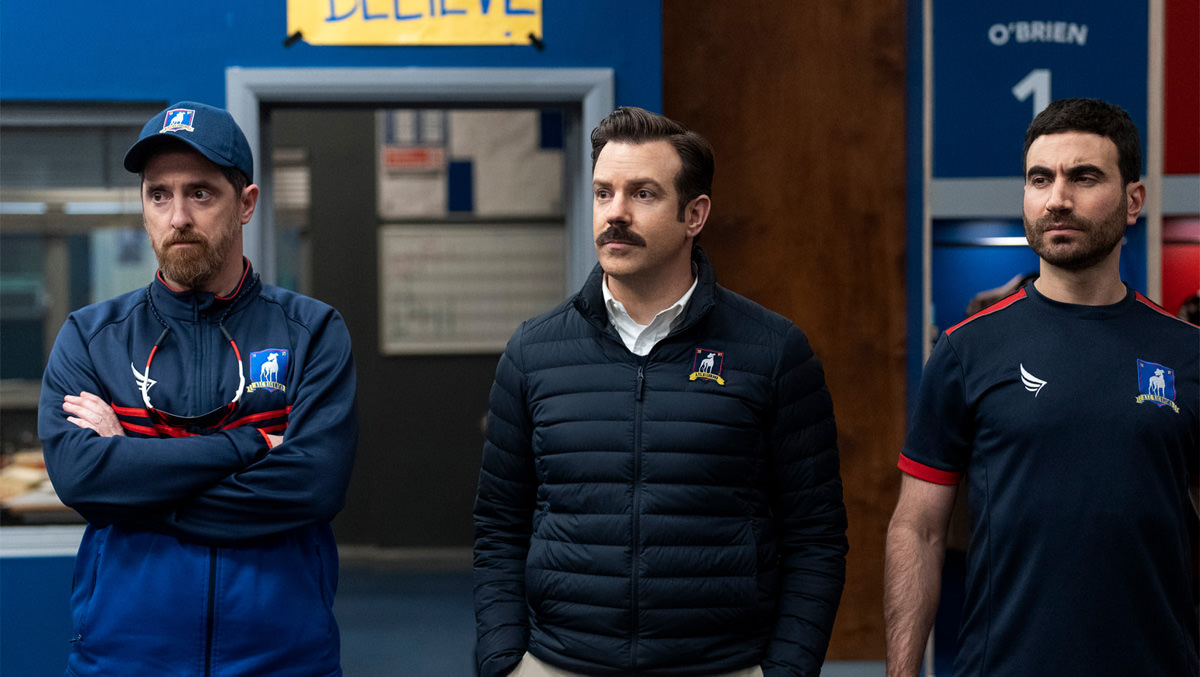
In the interests of all those folks making the argument that you should wait until a season is over before opining on whether it’s working… here we go.
In the Ted Lasso season 2 finale, when Ted faced off against a room full of reporters after AFC Richmond earned a spot back in the league, he told the room he wanted to address the scandalous report that he had a panic attack earlier in the season that forced him off the field. He announced that he wanted to talk about “the way we discuss and deal with mental health in athletics.” Then the scene cut. We never heard any of Ted’s thoughts on the topic; a topic that absolutely defines his entire character arc over two seasons and also a topic that’s one of the major themes of the second season. The bombshell cliffhanger of the previous episode simply fizzled out with pretty much no repercussions (except for Trent losing his job). Even the team shrugged when Ted told them not to worry about who the leak was.
When Sam Obisanya revealed to the billionaire who’d been courting him to leave the team that he had no intention of doing so, this very powerful and highly influential man lost his temper and threatened to ruin the young player’s life and career. In response, Sam arched an eyebrow and chuckled. Far be it for us to tell anyone how they’re supposed to react to things, but it seems to us most humans would be at least a little concerned if someone that powerful and wealthy threatened to destroy them – especially a 21-year-old who has a history of agonizing over everything in his life. We understand it as growth on Sam’s part, but it’s one of those major leaps forward (or backwards, in some cases) that have tended to define a lot of the character work this season; a turn that feels “unsupported by the text,” as a literary analysis might put it.
When Roy Kent deflated at the response from Keeley that she simply couldn’t go away with him while starting a new job and he asked her if they were breaking up, she said “I’ll see you in six weeks.” Then the episode went through several scenes over the course of several months and didn’t see fit to return to this self-imposed deadline, even though it had been established and passed in the space of a few minutes. Nothing wrong with leaving a relationship’s status in the air as a season finale cliffhanger, but it felt jarring to go from “I’ll see you in six weeks” to a title card reading “Two months later” and have the scenes be completely unrelated.
This will not be a trashing of Ted Lasso‘s second season. We know that the show is beloved and we also know that it has a fandom that doesn’t like to hear a lot of criticism surrounding it. Over the course of the season, the show has done a tremendous job of writing complex, flawed characters and imbuing all of their interactions with nuance and subtlety. It is, in every good sense of the phrase, the most adult comedy show currently airing. Every one of its performances is perfect (every Emmy nom was warranted) and each of its characters are well drawn, complicated, maddening and lovable in their own way. Real people interacting. It’s not an easy thing to pull off and the show deserved every bit of the praise it received. Additionally, it has done a tremendous job of unpacking toxic masculinity and how fathers wound their sons (and in Rebecca’s case, daughters) for life, as seen in the stories of Ted, Jamie and Nate – all of whom have been emotionally damaged by their fathers and each of whom are dealing with it in very different ways. We should also pause here and note that Dr. Sharon is far and away our favorite new character on television and we absolutely loved the way the show created a grownup relationship between two people who have no reason to like each other, who nonetheless work like adults on the issues that separate them and come together in friendship in a way that pays respect to both points of view and diminishes neither of them. It is easily one of the best-written relationships we’ve seen onscreen all year. A lesser show would have made them mortal enemies and mined their differences for comedy. Ted Lasso showed how to do the work in a relationship and the payoff was all that sweeter for it. You just don’t see that onscreen as much as you should.
But the most persistent criticism of Ted Lasso‘s sophomore season (a criticism that the show’s creators and fans have pushed against) is that it lacks conflict. That circles around the issue without quite hitting the bullseye (to use a Ted-ism). There has been a ton of conflict this season: Sam’s moral crisis regarding the team’s sponsor, Rebecca’s emotional fallout from her divorce and her father’s death, Ted’s ongoing mental health crisis, Nate’s turn toward the dark side, Jaime’s road to redemption, Keeley and Roy’s relationship problems, Rebecca and Sam’s relationship problems, Coach Beard’s relationship problems — are we seeing a pattern here? A good deal of the conflict this season was internal, mostly about people warring against their own dark sides, insecurities, and bad habits. The way we see it – and have seen it all season – is that Ted Lasso doesn’t lack conflict, it suffers from poor pacing and follow-through.
Early in the season, Sam put the team in a tough spot by protesting against its main sponsor, which forced Rebecca into a position where she was ordered to fire him. She chose not to and the sponsor seemingly shrugged and moved on. We don’t like to critique a show or movie based on what we thought the plot should have been, but this storyline hung over the entire season and simply went nowhere. Conflict was introduced and then immediately dispensed with. This is of a piece with the Roy and Keeley storyline, in which conflicts are constantly being introduced and either waved away or seemingly forgotten. Granted, this was often played for laughs and used as a way to define their relationship (Roy: “Are you fucking talking about me?” Keeley (brightly): “Yeah!”), but if you keep introducing conflict only to show that it bounces right off them, you can’t expect the audience to truly become invested in the idea that they’re in any danger. There was a moment in the season premiere when Rebecca looked knowingly at Keeley when Jamie’s return to the team was announced. It wasn’t addressed, alluded to or mentioned again. Something like six episodes went by before the conflict of Keeley’s affections arose again – and it was dispensed with almost immediately. Rebecca spends the first half of the season giddily texting her crush (which was a huge letdown from her powerhouse performance and meaty storyline in season one). Her parents are introduced, then her father is almost immediately killed off so that we can learn the source of all of her anger and mistrust. To be fair, the funeral scene was probably the best one of the season and it did pay off Hannah Waddingham’s great character work, but again, the pacing seemed to be way off. There were at least four or five episodes where the conflict with her father could have been explained or portrayed. Additionally, the rather glaring and massive conflict of her relationship with Sam (both his youth and the fact of her status as his employer are deeply problematic) is treated like a little speed bump on the way to bed and barely referenced again. We don’t need a show or movie to hold our hands and inform us whether characters are doing the right thing or not, but it seemed really strange that in all the discussions about her relationship, there was almost no time given to any sort of point of view that might have found it wrong.
On a similar, but less serious note, Jamie went from the biggest dick on the team to someone with insight, empathy and even a little courage. While we can point to certain things that illuminate his character shift – Ted’s kindness, Roy’s sense of fairness, Jamie’s father’s cruelty and how the team responded to it – most of the actual change happened offscreen. Jamie was a jerk, here are a few reasons why, here are a few people being nice to him, and now Jamie’s not a jerk anymore. To be fair, Roy hugging Jamie after head-butting him was a spectacularly emotional moment that felt true to the characters and their journey, but it was the journey itself that came off kind of spotty.
Two character journeys that didn’t suffer from pacing issues or out-of-nowhere conflicts were Nate’s turn toward darkness and its well-balanced opposite, Ted’s journey toward emotional wellness. In fact, these arcs were so well-drawn that the intricate writing and subtle acting of their stories throw all of the other ones into relief and tend to point out how barely sketched they were in comparison. Nick Mohammed deserves as much credit as the writers do for portraying Nate’s frustrations with empathy, even as they showed his actions to be nearly unforgivable. By keeping the focus on Nate’s simmering anger all season, the writing offered a character turn that made perfect sense and didn’t need any further explanation. Nate’s story works so well not just because it’s a perfect counter to Ted’s feel-good personality or because it thoroughly illustrates the darker side of the themes being explored. It’s because Nate is in many ways a perfect foil to so many of the other men. It points out the gentler masculinity of Ted and Beard and the more evolved masculinity of Roy, and it shows what happens when you don’t do the work of unpacking the damage your father has done to you, like Ted and (apparently offscreen) Jamie have done. Their final confrontation was just perfectly written and performed.
But this is our issue with the series now: it writes such beautiful characters and relationships that it can bring an audience to tears with just a hug or a few lines from a song. It’s fantastic at sticking with themes and unpacking them in complex and interesting ways. But as much as we’ve loved the show, the second season was a bumpy ride with dropped plotlines, diversions that didn’t pay off, character turns that went unexplained or unexamined, and conflicts that seemed to erupt suddenly and then dissipate just as quickly. Much of this could have been avoided if the first half of the season didn’t feel like it was just spinning its wheels on all the feel-good stuff. The conflicts were there, but forgotten about for just a little too long, and some of them simply haven’t played out enough in front of the audience. We get the impression that the people behind Ted Lasso wrote a bunch of characters they love so much that, Nate aside, they’re loath to dive too far into the darker or lesser sides of their personalities without waving most of it away. This is the middle season in a planned three-season storyline and we suspect many fans will say to wait and let it all play out. We are, of course, in for the ride and have little doubt that most of these characters will complete satisfying, well-drawn arcs in the end. But for us at least, there’s no denying that this show is great at setups and conclusions, but often a little murky or vague on the middle parts.
Palomo Spain Spring 2022 Menswear Collection Next Post:
Kim Kardashian Out and About in Balenciaga in NYC, Switching Things Up
Please review our Community Guidelines before posting a comment. Thank you!



